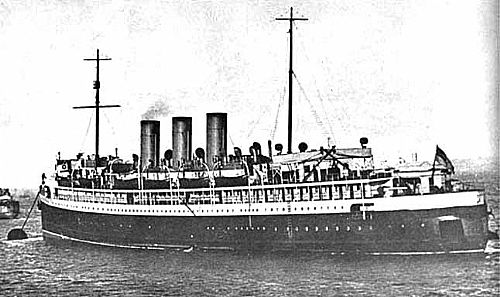The Rainham Seaman Torpedoed on Two Ships on the Same Day in 1914
Originally from Portsmouth where he joined the navy in 1888, John Brading moved to Rainham in 1906 and continued his naval service.
With the outbreak of the Great War in 1914 Brading served on HMS Hogue. On September 20th his vessel along with HMS Aboukir, HMS Cressy and HMS Euryalus were sent to patrol the Broad Fourteens, an area located near the Dutch and Belgian coastlines to look out for German naval war vessels. They were not escorted by destroyers which made them vulnerable to submarine attacks.
On September 20th HMS Euryalus turned back to Sheerness because of an aerial problem while the other three cruisers continued their journey. On September 22nd German submarine U9 spotted the cruisers and fired a single torpedo that struck HMS Aboukir on the port side causing heavy flooding. The vessel capsized after 25 minutes and sank five minutes later. While this was happening Aboukir’s captain Drummond ordered the crew to abandon ship.
While the Hogue and Cressy were preparing to pick up survivors from the stricken HMS Aboukir they were also torpedoed. U9 fired two torpedoes at the Hogue and one of these hit her amidships which flooded the engine room. The second torpedo struck a few feet from the first followed by a third explosion caused by an ignited magazine which resulted in the vessel listing over to forty degrees as the sea poured in on the waterline amidships. Realizing that the ship was sinking John Brading jumped into the sea with other members of the crew and swam towards Cressy as fast as possible to avoid being sucked under the water by the vortex of the sinking Hogue.
Soon after Brading had climbed aboard the Cressy which had moved in towards Hogue to rescue survivors, it was also struck by a torpedo in the starboard boiler room and listed but did not start sinking immediately. When a second torpedo struck and the vessel began to keel over crew members began jumping overboard which included Brading. He jumped into the cold sea for the second time that day where he remained for four hours bobbing up and down in high waves amongst dead bodies and about 2,000 sailors struggling amongst a mass of wreckage and pieces of wood to which most of them clung. Many were paralysed with shock and cold while they waited to be rescued. In the meantime, the triumphant German submarine U9 moved off towards the German port of Wilhelmshaven because all six of its torpedoes had been fired and the captain was fearful of British destroyers arriving in the area. One 493 ton U-boat with a crew of 28 had destroyed 36,000 tons of three British cruisers in less than 90 minutes which served as great propaganda for the Germans.
Brading and other survivors were rescued by the Dutch merchant ships Flora and Titan and British trawlers JGC and Coriander before a force of light cruisers and destroyers arrived from Harwich and escorted the survivors aboard the British vessels to the English port of Lowestoft while Flora and Titan sailed with survivors to Holland. In total 837 men were rescued but 1,459 died. Many of these were young cadets and reservists. The incident caused an outcry in the UK at a time when submarines were not seen as a serious threat so it established the U-boat as a major threat in warfare and questioned the invincibility of the Royal Navy.

Photo of HMS Princess Irene, a similar ship from WW1.
Because of the psychological effects of his experiences on September 22nd from which he never fully recovered, Brading worked at Tilbury Docks as an armourer assisting with the arming of liners for the remainder of the war then retired from the navy after the conflict had finished.
In 1920 Brading moved to Edwin Road in Rainham where he lived with his wife and two children. He later became a trustee of the Rainham Methodist Church in Station Road where he became well-known for organising children’s social events, he worked with the Royal Naval Temperance Society and he also became a playing member at Gillingham Bowls Club. He was left with only memories of that fateful day on September 22nd 1914 before he died aged 68 in August 1939.
David Wood.











































































































































Comments
I was more than interested to read your article on John Brading, as he was my grandfather. Unfortunately I never knew him as he died 7 years before I was born. The bungalow (Nutcombe) at 68 Edwin road was my family home until the age of nine when we moved to London. Although I have a number of photos of John and know something of him from conversations with my mother Ena, I never knew that he worked at Tilbury Docks. Perhaps you have other information which you could share with me. Kindest regards. John (Matthews)
RSS feed for comments to this post